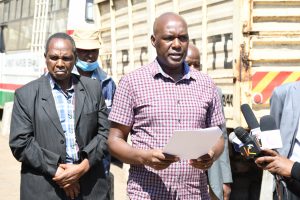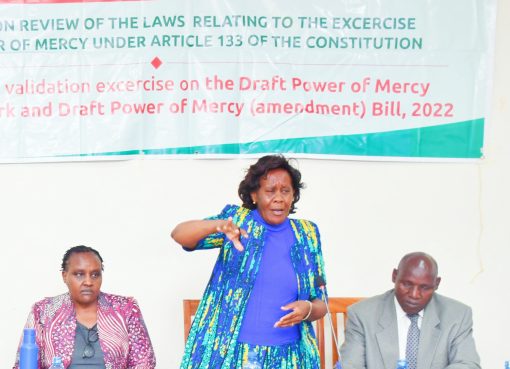Farmers should be involved in formulation of all initiatives aimed at supporting coffee and in all decision making on matters regarding the sector.
Kenya Coffee Producers Association (KCPA) officials decried that farmers were not involved in the development of government interventions measures despite the fact that they were the key stakeholders in the sector.
Giving the status of the coffee industry in Kenya, KCPA chairman Peter Gikonyo at a press conference at Wakulima house said that in many occasions, draft policies were finalized without their input only for the farmers to be informed when such documents were ready for a ceremonial ratification.
He regretted that public participation initiatives were conducted as a formality yet the farmers who were the chief recipient of such legislation in most cases do not understand the genesis and objectives of the interventions.
“This would not be the case if farmers are involved during formulation state and there is therefore need for strong working relationship with farmers representative organization in a more structured engagement for the common good of all players”, , he said .
Gikonyo noted that there was poor coordination due to conflicting legal structures because too many government agencies were involved in the coffee industry where none of the players appears to read from the same script causing the current confusion in the sector.

Peter Gikonyo, Chairman Kenya Coffee Producers Association, reads a statement on the status of coffee industry in the country today at the Kenya Planters Co-operative Union Head offices in Nairobi where he was flanked by other association members.
Kenyan coffee production, the chairman said has been declining from a high of 130,000 metric tones in the 80s to the current 40,000 tons with majority of small holder coffee farmers currently producing less than 2kgs tree per year against an annual potential of 35kg per tree.
“Most government led initiatives have focused more on marketing and very little on production and this has resulted to a decline in production over the years spelling doom for an industry that is a source of livelihoods for over 5 million Kenyans both directly and indirectly”, he said.
COVID 19 effects, Gikonyo said have also affected the coffee farmers in various ways such as increased cost of production, compromised quality, reduced demand of coffee and increased cost of logistics.
“The pandemic has made worse an already bad situation given the world coffee prices were already bad for the producers at the beginning of the year before COVID 19”, he said
The chairman has also come out to say that what is even more worrying is the recent development of border rejection of the Kenyan coffee in Japan and Korea due to the presence of chemical residues and Ochratoxin (OTA) as alleged by the markets.
“According to these countries, food standards are a major cause of concern that having maximum allowable limit has led to flagging of Kenyan coffee entering the Japanese market for the next three years from 2019 result to a total ban of Kenyans coffee”, he noted.
Kenya coffee statistics in the 2017/2018 show that Korea imported 10 12 percent of the total coffee exports taking fourth position after Germany, United states and Belgium.
Gikonyo explained that some of the reasons for the threat is the gaps on certification procedures for coffee agro chemicals inadequacy of farmers on post-harvest of handling coffee and also gaps on coffee export regulations and enforcements.
The chairman was flanked by the KCPA CEO, Sarah Nyaga who said that small holder coffee farmers play a key role in the industry considering that 60 to 70 percent of the total coffee production is done by the over 800,000 farmers comprising 99.6 percent of the total coffee farmers in the country.
“As much as producers are key to the industry, they are not a happy lot because of demotivation in terms of what comes into their pockets and yet the idea of this business is that a farmer can be able to put money in their pocket”, she said
Nyaga explained that during the commemoration of the international coffee day last week there was nothing good to celebrate for the small holder farmers and yet the theme for the celebration was ‘Coffee in the next generation’.
“This is an industry that is earning the Kenyan government 230 million USD annually and a source of food security contributing to the country’s big four agenda”, Nyaga said
The lobby group has called on the government to not only develop and implement initiatives to address slow coffee production but also to remove taxes on farm inputs and also waive debts for cooperatives societies in a structured manner.
By Wangari Ndirangu




